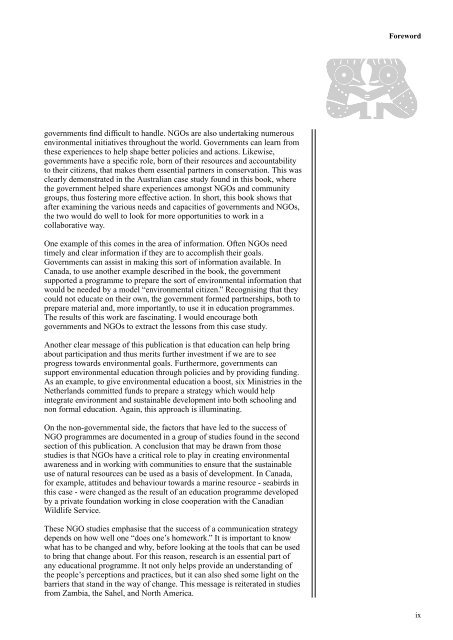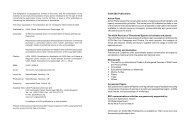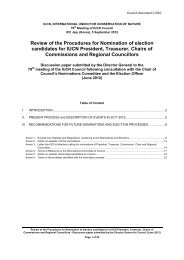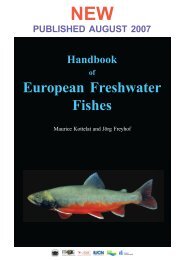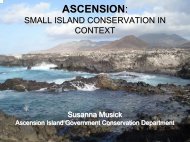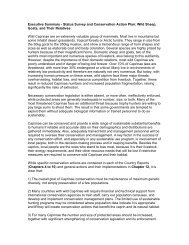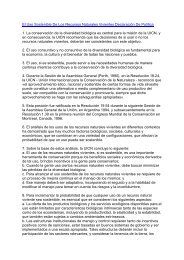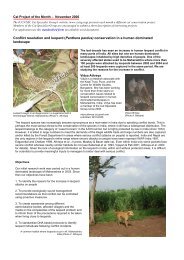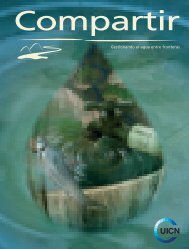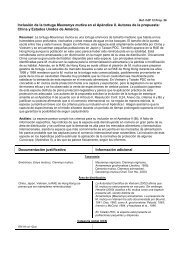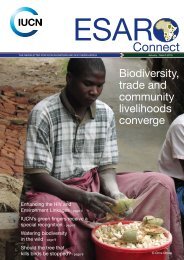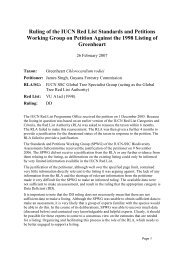Planning education to care for the earth - IUCN Knowledge Network
Planning education to care for the earth - IUCN Knowledge Network
Planning education to care for the earth - IUCN Knowledge Network
Create successful ePaper yourself
Turn your PDF publications into a flip-book with our unique Google optimized e-Paper software.
Forewordgovernments find difficult <strong>to</strong> handle. NGOs are also undertaking numerousenvironmental initiatives throughout <strong>the</strong> world. Governments can learn from<strong>the</strong>se experiences <strong>to</strong> help shape better policies and actions. Likewise,governments have a specific role, born of <strong>the</strong>ir resources and accountability<strong>to</strong> <strong>the</strong>ir citizens, that makes <strong>the</strong>m essential partners in conservation. This wasclearly demonstrated in <strong>the</strong> Australian case study found in this book, where<strong>the</strong> government helped share experiences amongst NGOs and communitygroups, thus fostering more effective action. In short, this book shows thatafter examining <strong>the</strong> various needs and capacities of governments and NGOs,<strong>the</strong> two would do well <strong>to</strong> look <strong>for</strong> more opportunities <strong>to</strong> work in acollaborative way.One example of this comes in <strong>the</strong> area of in<strong>for</strong>mation. Often NGOs needtimely and clear in<strong>for</strong>mation if <strong>the</strong>y are <strong>to</strong> accomplish <strong>the</strong>ir goals.Governments can assist in making this sort of in<strong>for</strong>mation available. InCanada, <strong>to</strong> use ano<strong>the</strong>r example described in <strong>the</strong> book, <strong>the</strong> governmentsupported a programme <strong>to</strong> prepare <strong>the</strong> sort of environmental in<strong>for</strong>mation thatwould be needed by a model “environmental citizen.” Recognising that <strong>the</strong>ycould not educate on <strong>the</strong>ir own, <strong>the</strong> government <strong>for</strong>med partnerships, both <strong>to</strong>prepare material and, more importantly, <strong>to</strong> use it in <strong>education</strong> programmes.The results of this work are fascinating. I would encourage bothgovernments and NGOs <strong>to</strong> extract <strong>the</strong> lessons from this case study.Ano<strong>the</strong>r clear message of this publication is that <strong>education</strong> can help bringabout participation and thus merits fur<strong>the</strong>r investment if we are <strong>to</strong> seeprogress <strong>to</strong>wards environmental goals. Fur<strong>the</strong>rmore, governments cansupport environmental <strong>education</strong> through policies and by providing funding.As an example, <strong>to</strong> give environmental <strong>education</strong> a boost, six Ministries in <strong>the</strong>Ne<strong>the</strong>rlands committed funds <strong>to</strong> prepare a strategy which would helpintegrate environment and sustainable development in<strong>to</strong> both schooling andnon <strong>for</strong>mal <strong>education</strong>. Again, this approach is illuminating.On <strong>the</strong> non-governmental side, <strong>the</strong> fac<strong>to</strong>rs that have led <strong>to</strong> <strong>the</strong> success ofNGO programmes are documented in a group of studies found in <strong>the</strong> secondsection of this publication. A conclusion that may be drawn from thosestudies is that NGOs have a critical role <strong>to</strong> play in creating environmentalawareness and in working with communities <strong>to</strong> ensure that <strong>the</strong> sustainableuse of natural resources can be used as a basis of development. In Canada,<strong>for</strong> example, attitudes and behaviour <strong>to</strong>wards a marine resource - seabirds inthis case - were changed as <strong>the</strong> result of an <strong>education</strong> programme developedby a private foundation working in close cooperation with <strong>the</strong> CanadianWildlife Service.These NGO studies emphasise that <strong>the</strong> success of a communication strategydepends on how well one “does one’s homework.” It is important <strong>to</strong> knowwhat has <strong>to</strong> be changed and why, be<strong>for</strong>e looking at <strong>the</strong> <strong>to</strong>ols that can be used<strong>to</strong> bring that change about. For this reason, research is an essential part ofany <strong>education</strong>al programme. It not only helps provide an understanding of<strong>the</strong> people’s perceptions and practices, but it can also shed some light on <strong>the</strong>barriers that stand in <strong>the</strong> way of change. This message is reiterated in studiesfrom Zambia, <strong>the</strong> Sahel, and North America.ix


